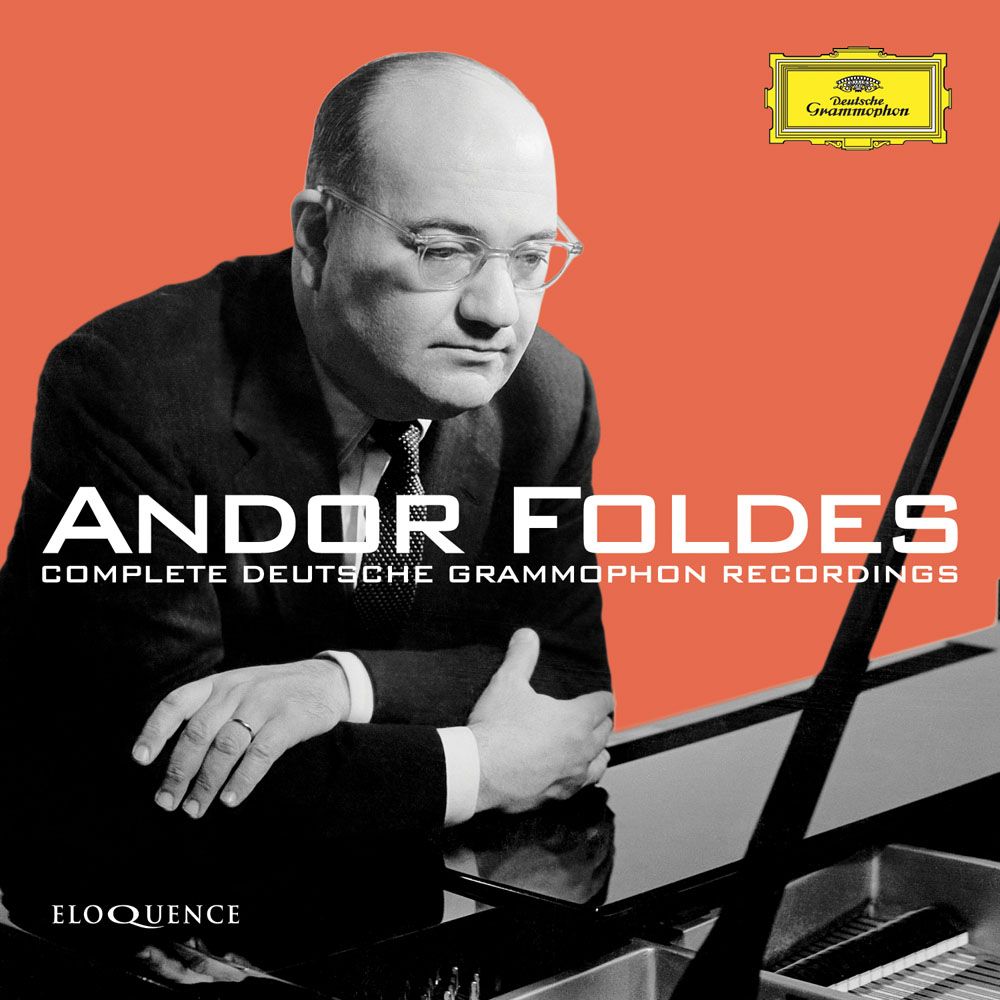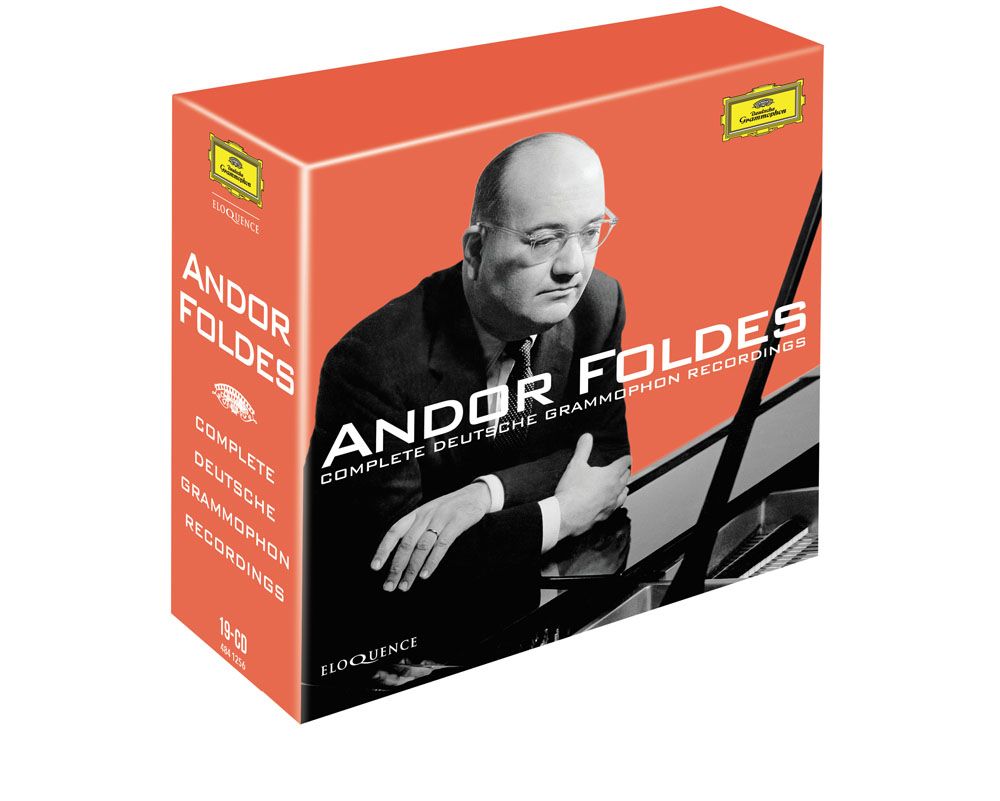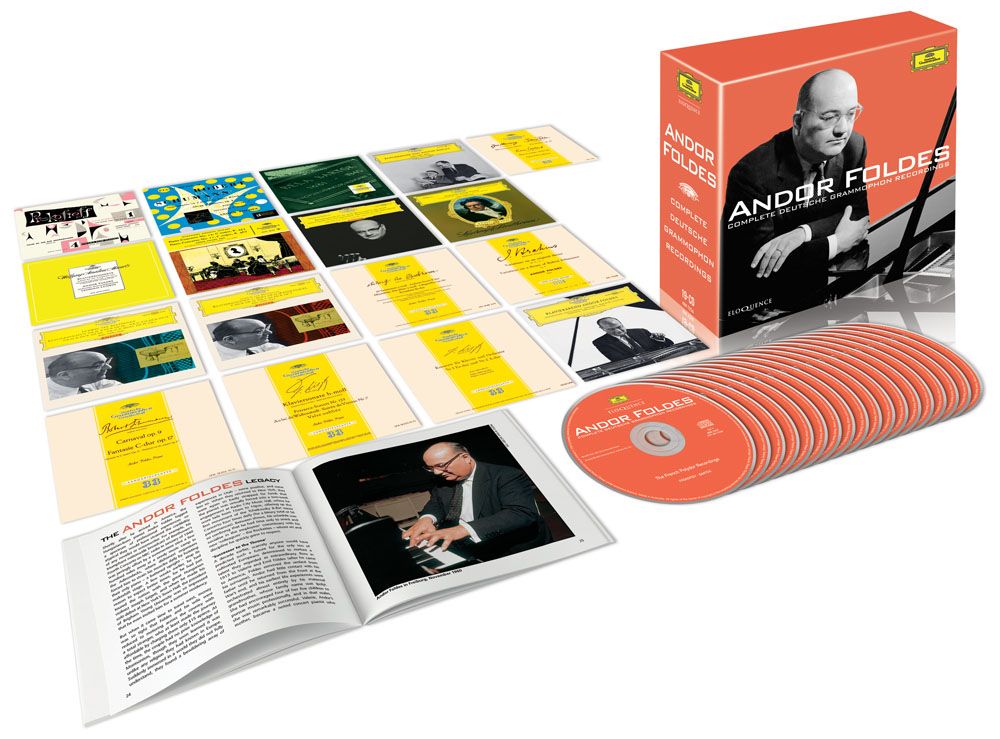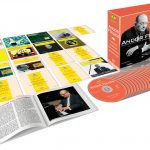The most comprehensive tribute ever issued to Hungarian pianist Andor Foldes (1913–1992) renowned for his polished and self-effacing style, containing many recordings new to CD, freshly remastered and enhanced by an extensive booklet appreciation by Stephen Siek and rarely reproduced photographs from the DG archive.
Writing in 1961 – not yet 50 years of age – the Hungarian pianist Andor Foldes cast his mind back to student days in Budapest, and to pre-war rehearsals led by Bruno Walter. ‘We all were convinced that this was the way Mozart wanted his work to be played: without frills, without any undue virtuosity on the part of the soloist … Playing like one big happy family, in the service of a higher power – Mozart’s spirit.’
Throughout his career Foldes cultivated and emulated those qualities he discerned in Walter’s artistry. Such modesty and assurance are the hallmarks of his recordings, beginning here with the Bartók and Prokofiev he recorded in Paris in 1949-50 and which was released on French Polydor.
Memorably direct accounts of Grieg and Schumann were released on Mercury, before Foldes settled down with Deutsche Grammophon, the most lasting and symbiotically satisfying artist-label relationship of his career. DG’s 1950s mono sound, analytical but not airless, was ideally suited to the Foldes sound, and he opened his account with the unlikely trio of Albéniz, Stravinsky and Virgil Thomson. Brahms, Liszt and Schumann classics soon followed: unhackneyed, freshly voiced interpretations of Romantic repertoire made in 1951-3, much of it receiving their first release on CD.
Then came a wide-ranging survey over four LPs of the solo piano music by his teacher Bartók. These recordings were recognised for their authority and authenticity, and Foldes became especially prized in his adopted home of the USA as a specialist in contemporary music. He wrote well and often about new piano music by the flourishing generation of postwar American composers, and his recordings brought spice to the fairly heavy standard fare of the DG catalogue.
Insightfully straightforward sets of Mozart and Beethoven concertos straddle the mono and stereo eras, before Foldes turned in the 1960s to the foundational treasury of Beethoven’s sonatas – though an album of shorter works, plus a ‘keyboard evening’ of shorter pieces from Bach to Poulenc showed that he continued to bestow astonishingly clean articulation and devotion to the score to all his repertoire.
CD 1
SERGEI PROKOFIEV (1891–1953)
1–3 Piano Concerto No. 1 in D flat major, Op. 10
Orchestre Lamoureux
Jean Martinon
4–7 Tales of the Old Grandmother, Op. 31
8–11 Four Pieces, Op. 32
BÉLA BARTÓK (1881–1945)
12–14 Piano Sonata, Sz.80 (BB 88)
15–17 Piano Concerto No. 2, Sz.95 (BB 101)
Orchestre Lamoureux
Eugène Bigot
FIRST RELEASE ON CD
CD 2
ROBERT SCHUMANN (1810–1856)
1–11 Impromptus on a Theme by Clara Wieck, Op. 5
12–17 Abegg Variations, Op. 1
18–30 Papillons, Op. 2
31 Toccata in C major, Op. 7
EDVARD GRIEG (1843–1907)
32–47 Norwegian Peasant Dances (‘Slåtter’), Op. 72
FIRST RELEASE ON CD
CD 3
BÉLA BARTÓK (1881–1945)
1–17 For Children, Sz.42 (BB 53): Books I & II (excerpts)
18–20 Sonatina, Sz.55 (BB 69)
21–26 Mikrokosmos, Sz.107 (BB 105): Book IV (excerpts)
27–33 Mikrokosmos, Sz.107 (BB 105): Book V (excerpts)
34–44 Mikrokosmos, Sz.107 (BB 105): Book VI (excerpts)
45–50 For Children, Sz.42 (BB 53): Book III (excerpts)
51–54 For Children, Sz.42 (BB 53): Book IV (excerpts)
55–56 Two Elegies, Sz.41 (BB 49)
CD 4
BÉLA BARTÓK (1881–1945)
1–6 Six Romanian Folk Dances, Sz.56 (BB 68)
7 Fantasy II (No. 3 of Four Piano Pieces, Sz.22, BB 27)
8–14 Seven Sketches, Sz.44 (BB 54)
15 Improvisations on Hungarian Peasant Songs, Sz.74 (BB 83)
16 Fifteen Hungarian Peasant Songs, Sz.71 (BB 79)
17–19 Sonata for Piano, Sz.80 (BB 88)
20–22 Three Rondos on Hungarian Folk Tunes, Sz.84 (BB 92)
23–24 Romanian Christmas Carols, Sz.57 (BB 67)
CD 5
BÉLA BARTÓK (1881–1945)
1–4 Suite, Sz.62 (BB 70)
5–9 Out of Doors, Sz.81 (BB 89)
10–15 Nine Little Piano Pieces, Sz.82 (BB 90)
16–26 Ten Easy Piano Pieces, Sz.39 (BB 51)
27–29 Three Burlesques, Sz.47 (BB 55)
30 Allegro barbaro, Sz.49 (BB 63)
CD 6
ZOLTÁN KODÁLY (1882–1967)
1–3 Háry János: Suite (excerpts, arr. Foldes)
4 Children’s Dances
5 Dances of Marosszék
6–10 Seven Piano Pieces, Op. 11 (excerpts)
CD 7
SAMUEL BARBER (1910–1981)
1–4 Excursions, Op. 20
AARON COPLAND (1900–1990)
5–7 Piano Sonata (1939–41)
IGOR STRAVINSKY (1882–1971)
8–10 Piano Sonata (1924)
11 Circus Polka for a Young Elephant
VIRGIL THOMSON (1896–1989)
12 Ragtime Bass in C sharp major
ISAAC ALBÉNIZ (1860–1909)
13 Tango, Op. 165 No. 2
CD 8
WOLFGANG AMADEUS MOZART (1756–1791)
1–3 Concerto No. 10 in E flat major for Two Pianos and Orchestra, KV 365
Carl Seemann, piano I
Andor Foldes, piano II
Berliner Philharmoniker
Fritz Lehmann
4–6 Piano Concerto No. 15 in B flat major, KV 450
Berliner Philharmoniker
Leopold Ludwig
7–9 Piano Concerto No. 21 in C major, KV 467
Berliner Philharmoniker
Paul Schmitz
CD 9
WOLFGANG AMADEUS MOZART (1756–1791)
1–3 Piano Concerto No. 17 in G major, KV 453
Berliner Philharmoniker
Fritz Lehmann
4–6 Piano Concerto No. 25 in C major, KV 503
Berliner Philharmoniker
Leopold Ludwig
LUDWIG VAN BEETHOVEN (1770–1827)
7 Fantasia in C minor for Piano, Chorus and Orchestra, Op. 80
RIAS Kammerchor
Berliner Motettenchor
Berliner Philharmoniker
Fritz Lehmann
CD 10
LUDWIG VAN BEETHOVEN (1770–1827)
1–3 Piano Concerto No. 1 in C major, Op. 15
4–6 Piano Concerto No. 5 in E flat major, Op. 73 ‘Emperor’
Bamberg Symphony Orchestra (No. 1)
Berliner Philharmoniker (No. 5)
Ferdinand Leitner
CD 11
LUDWIG VAN BEETHOVEN (1770–1827)
1–3 Piano Sonata No. 8 in C minor, Op. 13 ‘Pathétique’
4–7 Piano Sonata No. 15 in D major, Op. 28 ‘Pastorale’
8–10 Piano Sonata No. 17 in D minor, Op. 31 No. 2 ‘Tempest’
11–13 Piano Sonata No. 21 in C major, Op. 53 ‘Waldstein’
CD 12
LUDWIG VAN BEETHOVEN (1770–1827)
1–3 Piano Sonata No. 23 in F minor, Op. 57 ‘Appassionata’
4–6 Piano Sonata No. 26 in E flat major, Op. 81a ‘Les adieux’
7–10 Piano Sonata No. 28 in A major, Op. 101
11–13 Piano Sonata No. 30 in E major, Op. 109
CD 13
LUDWIG VAN BEETHOVEN (1770–1827)
1–4 Piano Sonata No. 4 in E flat major, Op. 7
5–7 Piano Sonata No. 9 in E major, Op. 14 No. 1
8–9 Piano Sonata No. 19 in G minor, Op. 49 No. 1
10–12 Piano Sonata No. 31 in A flat major, Op. 110
CD 14
LUDWIG VAN BEETHOVEN (1770–1827)
1–2 Piano Sonata No. 24 in F sharp major, Op. 78 ‘À Thérèse’
3–5 Piano Sonata No. 25 in G major, Op. 79
6 Bagatelle in A minor, WoO 59 ‘Für Elise’
7–12 Six Bagatelles, Op. 126
13 Ecossaise in E flat major, WoO 86
14 Andante favori in F major, WoO 57
15 32 Variations in C minor on an original theme, WoO 80
16–17 Two Rondos, Op. 51
CD 15
JOHANNES BRAHMS (1833–1897)
1–12 Variations on an Original Theme in D major, Op. 21 No. 1
13–29 Variations on a theme by Schumann in F sharp minor, Op. 9
Variations on a theme by Paganini, Op. 35
30–44 Book I
45–59 Book II
FIRST RELEASE ON CD
CD 16
ROBERT SCHUMANN (1810–1856)
1–21 Carnaval, Op. 9
22–24 Fantasie in C major, Op. 17
FIRST RELEASE ON CD
CD 17
FRANZ LISZT (1811–1886)
1–3 Piano Sonata in B minor, S.178
Années de pèlerinage – Deuxième année: Italie, S.161
4 No. 6: Sonetto 123 del Petrarca
Années de pèlerinage: Première année: Suisse, S. 160
5 No. 2: Au lac de Wallenstadt
Soirées de Vienne, S.427
6 No. 4: Andantino a capriccio
7 No. 7: Allegro spiritoso
8 Valse oubliée No. 1, S.215
FIRST RELEASE ON CD
CD 18
FRANZ LISZT (1811–1886)
1–3 Piano Concerto No. 1 in E flat major, S.124
4–9 Piano Concerto No. 2 in A major, S.125
SERGEI RACHMANINOV (1873–1943)
10–12 Piano Concerto No. 2 in C minor, Op. 18
Berliner Philharmoniker
Leopold Ludwig
CD 19
Klavierabend
JOHANN SEBASTIAN BACH (1685–1750)
1–2 Chromatic Fantasia and Fugue in D minor, BWV 903
LUDWIG VAN BEETHOVEN (1770–1827)
3–5 Piano Sonata No. 6 in F major, Op. 10 No. 2
JOHANNES BRAHMS (1833–1897)
Sixteen Waltzes, Op. 39 (excerpts)
6 No. 1 in B major (Tempo giusto)
7 No. 2 in E major
8 No. 3 in G sharp minor
9 No. 15 in A flat major
MANUEL DE FALLA (1876–1946)
10 Ritual Fire Dance (from El amor brujo, arr. Falla)
FRANCIS POULENC (1899–1963)
11 Nocturne No. 4 in C minor
CLAUDE DEBUSSY (1862–1918)
12 Prélude, Book I No. 8: La fille aux cheveux de lin
FRÉDÉRIC CHOPIN (1810–1849)
13 Mazurka in E minor, Op. 41 No. 1
14 Nocturne in C minor, Op. 48 No. 1
FRANZ LISZT (1811–1886)
15 Mephisto Waltz No. 1, S.514
Andor Foldes, piano
CD 1
Tracks 1-3
Recording: Salle Pleyel, Paris, France, 18 October 1950
Tracks 4-11
Recording: Salle Pleyel, Paris, France, 13 October 1950
Tracks 12-14
Recording: Salle Chopin, Paris, France, 28 June 1949
Original French Polydor Release: 566.318/9 (matrices GCP 197/200)
Tracks 15-17
Recording: Salle Pleyel, Paris, France, 27 & 29 June 1949
Original French Polydor Release: 566.320/2 (matrices: GCP 195/6 & 201/204)
CD 2
Tracks 1-11
First Mercury Release: MG 10122: 1953
Tracks 12-31
Recorded: 1950/51
First Mercury Release: MG 10122
Tracks 32-48
Recorded: 1950/51
First Mercury Release: MG 10136
CDs 3-5
Recording Producer: Karl-Heinz Schneider
Recording Engineer: Heinz Wildhagen
Editor: Wolfgang Toepffer
Recording Location: Beethovensaal, Hannover, Germany:
Fifteen Hungarian Peasant Songs (18 January 1955); Suite, Op. 14 (30 April & 3 May 1954); Sonatine (10 May 1955); Sonata (16–17 January 1955); Seven Sketches (9 May 1955); Romanian Christmas Carols (18 January 1955); Six Romanian Folk Dances (10–11 May 1955); Three Rondos on Hungarian Folk Tunes (30 April & 3 May 1954); Three Burlesques (7, 8 & 10 June 1955); Mikrokosmos: Books IV & V (12–13 May 1955); Mikrokosmos: Book VI – 140–153 (11 & 13 May 1955); Ten Easy Piano Pieces (6 & 11 June 1955); Nine Little Piano Pieces (9 & 10 June 1955); Improvisations on Hungarian Peasant Songs (19 January 1955); Out of Doors (6–9 June 1955); For Children (10 May 1955); Fantasy No. 2 (30 April & 3 May 1954); Two Elegies (16 January 1955); Allegro barbaro (10 June 1955)
Remastering Engineers: Michael Beier, Chris Bernauer
Original Deutsche Grammophon Releases: 18270, 18271, 18272, 18273: 1955
CD 6
Recordings: New York, USA, 2, 4 & 17 January 1957
Remastering Engineer: Michael Beier
Original Deutsche Grammophon Release: 18586: 1957
CD 7
Executive Producer: Elsa Schiller
Recording Producers: Karl-Heinz Schneider (Barber, Copland, Stravinsky: Sonata); Dr. Fred Hamel (Stravinsky: Circus Polka, Thomson, Albéniz)
Balance Engineers: Heinz Wildhagen (Barber, Copland, Stravinsky: Sonata); Karl-Heinz Westphal (Stravinsky: Circus Polka, Thomson, Albéniz)
Recording Location: Beethovensaal, Hannover, Germany, 1–7 July 1955 (Barber, Copland, Stravinsky: Sonata), 19 September 1951 (Stravinsky: Circus Polka, Thomson, Albéniz)
Remastering Engineer: Chris Bernauer
Original Deutsche Grammophon Releases: 18279: 1956 (Barber, Copland, Stravinsky: Sonata); NL 32212: 1951 (Stravinsky: Circus Polka, Thomson, Albéniz)
CD 8
Recording Producers: Karl-Heinz Schneider (KV 365); Dr. Manfred Richter (KV 450); Wolfgang Lohse (KV 467)
Balance Engineer: Heinz Wildhagen
Recording Location: Jesus-Christus-Kirche, Berlin, Germany, 18–20 April 1955 (KV 365), 11 & 14–16 October 1957 (KV 467), 6–8 February 1963 (KV 450)
Remastering Engineer: Chris Bernauer
Original Deutsche Grammophon Releases: 17240 (KV 365): 1955; 138796 (KV 450): 1963; 18457 (KV 467): 1958
CD 9
Recording Producers: Dr. Manfred Richter (KV 503); Heinz Reinicke (KV 453); Wolfgang Lohse (Beethoven)
Balance Engineers: Heinz Wildhagen (KV 503, Beethoven); Karl-Heinz Westphal (KV 453)
Recording Location: Jesus-Christus-Kirche, Berlin, Germany, 12–13 February 1954 (KV 453), 13–14 & 20 April 1955 (Beethoven), 6–8 February 1963 (KV 503)
Remastering Engineer: Chris Bernauer
Original Deutsche Grammophon Releases: 138796 (KV 503): 1963; 18457 (KV 453): 1954; 18234 (Beethoven): 1955
CD 10
Recording Producers: Hans Weber (No. 1); Wolfgang Lohse (No. 5)
Balance Engineers: Harald Baudis (No. 1); Heinz Wildhagen (No. 5)
Recording Locations: Kulturraum, Bamberg, Germany, 19 & 20 April 1960 (No. 1); Jesus-Christus-Kirche, Berlin, Germany, 24–25 November 1958 (No. 5)
Remastering Engineer: Michael Beier
Original Deutsche Grammophon Releases: 138636 (No. 1): 1960; 138019 (No. 5): 1959
CD 11
Recording Producers: Hans Weber (Op. 13, Op. 28, Op. 31 No. 2); Hans Ritter (Op. 53)
Balance Engineers: Heinz Wildhagen (Op. 13, Op. 28, Op. 53); Walter-Alfred Wettler (Op. 31 No. 2)
Recording Location: Beethoven-Saal, Hannover, Germany, 2 & 9 November 1961 (Op. 13), 3, 4, 5, 8 & 9 November 1961 (Op. 28), 11, 13 & 14 August 1960 (Op. 31 No. 2), 7–11 July 1958 (Op. 53)
Remastering Engineers: Michael Beier, Chris Bernauer
Original Deutsche Grammophon Releases: 138671 (Op. 13): 1963; 138784 (Op. 28, Op. 31 No. 2): 1962; 136027 (Op. 53): 1959
CD 12
Recording Producers: Karl-Heinz Schneider (Op. 57); Hans Weber (Op. 81a, Op. 101); Hans Ritter (Op. 109)
Balance Engineers: Heinz Wildhagen (Op. 57, Op. 81a, Op. 109); Harald Baudis (Op. 101)
Recording Locations: Beethoven-Saal, Hannover, Germany, 16–18 December 1958 (Sonata Op. 57), 7 & 9 November 1961 (Sonata Op. 81a); Jesus-Christus-Kirche, Berlin, Germany, 16–17 May 1960 (Sonata Op. 101), 3–4 February 1960 (Sonata Op. 109)
Remastering Engineer: Michael Beier
Original Deutsche Grammophon Releases: 136027 (Op. 57): 1959; 138784 (Op. 81a): 1962; 138643 (Op. 101, Op. 109): 1961
CD 13
Recording Producers: Hans Weber (Op. 7, Op. 14 No. 1, Op. 110); Hans Ritter (Op. 49 No. 1)
Balance Engineers: Walter-Alfred Wettler (Op. 7, Op. 14 No. 1); Heinz Wildhagen (Op. 49 No. 1); Harald Baudis (Sonata Op. 110)
Recording Locations: Jesus-Christus-Kirche, Berlin, Germany, 5–6 February 1960 (Op. 49 No. 1); Beethoven-Saal, Hannover, Germany, 8–10 & 12 August 1960 (Op. 7), 10–11 August 1960 (Op. 14 No. 1); Kulturraum, Bamberg, Germany, 20 & 21 April 1960 (Sonata Op. 110)
Remastering Engineers: Michael Beier, Chris Bernauer
Original Deutsche Grammophon Releases: 138671 (Op. 7, Op. 14 No. 1): 1963; 138643 (Op. 49 No. 1): 1961; 138636 (Op. 110): 1960
CD 14
Recording Producers: Hans Ritter (Sonata Op. 78); Karl-Heinz Schneider (Für Elise, Andante favori, Ecossaise, Bagatelles Op. 126, Sonata Op. 79); Klaus Fischer-Dieskau (Rondos Op. 51)
Balance Engineers: Heinz Wildhagen (Sonatas Op. 78, Op. 79, Variations WoO 80, Rondos Op. 51); Werner Wolf (Für Elise, Andante favori, Ecossaise, Bagatelles Op. 126)
Recording Locations: Jesus-Christus-Kirche, Berlin, Germany, 5–6 February 1960 (Sonata Op. 78); Grosser Saal, Musikhalle, Hamburg, Germany, 15 May 1957 (Für Elise, Andante favori), 18 & 19 May 1957 (Ecossaise), 15 & 18 May
1957 (Bagatelles Op. 126); Beethoven-Saal, Hannover, Germany, 30 June and 4 & 6 July 1957 (Variations WoO 80), 11 January 1959 (Rondos Op. 51), 15 December 1958 (Sonata Op. 79)
Remastering Engineer: Michael Beier
Original Deutsche Grammophon Releases: 138643 (Sonata Op. 78): 1961; 138019 (Sonata Op. 79): 1959; 118387 (Bagatelles, Ecossaise, Andante favori, Variations): 1957; 136027 (Rondos): 1959
CD 15
Recording Producers: Heinz Wildhagen (Variations on an Original Theme, Schumann Variations); Dr. Fred Hamel (Paganini Variations)
Balance Engineers: Heinz Wildhagen (Variations on an Original Theme, Schumann Variations); Karl-Heinz Westphal (Paganini Variations)
Recording Location: Beethoven-Saal, Hannover, Germany, 30 May 1952 (Variations on an Original Theme), 31 May 1952 (Schumann Variations), 18 September 1951 (Paganini Variations)
Remastering Engineer: Chris Bernauer
Original Deutsche Grammophon Releases: 17048 (Variations on an Original Theme, Schumann Variations); 16049 (Paganini Variations)
CD 16
Recording Producers: Karl-Heinz Schneider (Carnaval); Dr. Albert Karsch (Fantasie)
Balance Engineer: Heinz Wildhagen
Recording Location: Beethoven-Saal, Hannover, 22, 23 & 30 April 1954 (Carnaval), 5 January 1953 (Fantasie)
Remastering Engineer: Chris Bernauer
Original Deutsche Grammophon Release: 16108 (Carnaval): 1953; 16076 (Fantasie): 1953
CD 17
Recording Producers: Dr. Fred Hamel (Sonata); Dr. Albert Karsch (Années de pèlerinage, Soirées de Vienne, Valse oubliée)
Balance Engineers: Karl-Heinz Westphal (Sonata); Heinz Wildhagen (Années de pèlerinage, Soirées de Vienne, Valse oubliée)
Recording Location: Beethoven-Saal, Hannover, Germany, 17–18 September 1951 (Sonata), 6 January 1953 (Années de pèlerinage, Soirée de Vienne No. 7, Valse oubliée), 7 January 1953 (Soirée de Vienne No. 4)
Remastering Engineer: Chris Bernauer
Original Deutsche Grammophon Releases: 72137-8 (Sonata): 1952; 72327 (Années de pèlerinage, Soirée de Vienne No. 7, Valse oubliée): 1953; 172387 Soirée de Vienne No. 4): 1953
CD 18
Recording Producer: Wolfgang Lohse
Balance Engineers: Alfred Steinke (Liszt); Karl-Heinz Westphal (Rachmaninov)
Recording Location: Jesus-Christus-Kirche, Berlin, Germany, 26 February 1953 (Liszt: No. 1), 27 & 28 February 1953 (Liszt: No. 2); 23–25 April 1954 (Rachmaninov)
Remastering Engineer: Chris Bernauer
Original Deutsche Grammophon Releases: 18133 (Liszt): 1953; 18190 (Rachmaninov): 1954
CD 19
Recording Producer: Karl-Heinz Schneider
Balance Engineer: Heinz Wildhagen
Recording Location: Beethoven-Saal, Hannover, Germany, 6–7 November 1957 (Bach, Beethoven, Brahms, Poulenc, Chopin Mazurka), 24–25 March 1958 (Falla, Chopin Nocturne, Liszt)
Remastering Engineer: Chris Bernauer
Original Deutsche Grammophon Release: 136002: 1958
“Foldes plays it brilliantly, his strong fingers unerringly tracing the percussive outlines of the writing.” Gramophone, December 1949 (Bartók: Piano Concerto No.2)
“Mr. Foldes’s rapt performance … is exquisite.” Gramophone, September 1955 (Schumann: Fantasie)
“His infallibly precise technique, his sense of control and his grasp of structure serve him well, and it stands much to his credit that for at least some of the time he gives the impression that the Copland Sonata contains some worthwhile musical thought.” Gramophone, December 1956 (Barber, Copland, Stravinsky)
“Foldes, perfectly at home in this music, plays superbly.” High Fidelity, August 1957 (Kodály)
“Andor Foldes reveals himself here as a Beethoven player of stature. His singing tone and sensitive style are always balanced by an original and thoughtful approach.” Stereo Review, April 1958 (Beethoven, Variations, Rondos & Bagatelles)
“Mr. Foldes is one of the few pianists who can present them convincingly.” Notes, December 1958 (Brahms, Paganini Variations)
“Records made by Andor Foldes never fail to interest and the works he performs here … are played with an unblemished accuracy nothing short of astonishing. The recording is excellent.” Tempo, winter 1958 (Stravinsky, Copland)
“The Pastoral is treated as an 18th-century landscape of classic dignity. This performer is an artist, and this record is as good a collection as any to define the principles on which his artistry is based.” High Fidelity, November 1962 (Beethoven, Sonatas Opp. 28, 31 No.2, 81)
‘The performances here are restrained, delicately coloured… Foldes is no piano-wrecking virtuoso, although his technical ability seems very high. The effect he produces is rather one of intimacy and direct communication.’ High Fidelity, November 1962 (Beethoven, Sonatas Opp. 78, 101, 109)
“Mr. Foldes’s solid tone becomes almost meltingly lovely in some of the cadenzas, and this rarity makes it doubly effective.” High Fidelity, April 1957 (Liszt concertos)
“This Hungarian pianist seems able to slip unobtrusively into any given style and offer an idiomatic rendition.” High Fidelity, June 1962 (Klavierabend)
“A number of these performances remain more or less unmatched … Sample either Out of Doors or the Sonata and you’ll soon realise why these recordings have always won such extravagant plaudits.” Gramophone, July 2014 (Bartók: Solo Works)






